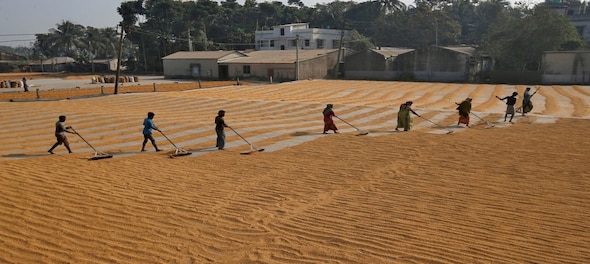
The Union government on Wednesday, September 14, said abnormal growth in exports alongside lower availability and higher prices of broken rice in domestic markets led to the ban on its export.
In an exclusive interview with CNBC-TV18, Food Secretary Sudhanshu Pandey said broken rice exports in the last four months (April to August), have gone up 42 times from 50,000 tonnes in the same period back in 2019.
Recently, the government imposed a 20 percent export duty on non-basmati rice except for parboiled rice to boost domestic supplies amid a fall in area under the paddy crop in the current kharif season. According to a notification by the Revenue Department, an export duty of 20 percent has been imposed on ‘rice in husk (paddy or rough)’ and ‘husked (brown) rice.’
Pandey said this exponential export growth is abnormal. "This has led to a spike in the prices in the domestic market. It used to be around Rs 15-16 in the domestic market, it went to almost Rs 22."
The secretary said the spike in the domestic price affects the prices of poultry feed and cattle feed, which in turn impacts the prices of poultry and cattle products. About 60-65 percent of the cost of poultry comprises its feedstock. "It has to been seen from that perspective."
He said the government has exempted Bangladesh and many of the Western African countries from the export ban as they are totally dependent on India for this variety
The food secretary said as of now, the government is reviewing the situation every day and steps will be taken accordingly.
Also Read: FM Nirmala Sitharaman compares India Inc to Hanuman and says industry not aware of own strength
Talking about edible oils, Pandey said prices have declined on a regular basis, especially those imported into the country, "However, if you compare it with the pre-COVID period, especially soybean and sunflower oils are still high by about 30-40 percent ."
"If you consider rates in that cycle, normally annual increase should not be more than 4-5 percent. So by that logic, in two years, the increase at best could be 10-11 percent, not 40-30 percent.
The food secretary said, "
(Edited by : Shoma Bhattacharjee)
First Published: Sept 14, 2022 7:16 PM IST
Check out our in-depth Market Coverage, Business News & get real-time Stock Market Updates on CNBC-TV18. Also, Watch our channels CNBC-TV18, CNBC Awaaz and CNBC Bajar Live on-the-go!


West Bengal Lok Sabha elections 2024: A look at Congress candidates
Apr 19, 2024 8:45 PM
West Bengal Lok Sabha elections: Abhishek Banerjee to Mahua Moitra, a look at TMC's candidates
Apr 19, 2024 6:14 PM
Chhattisgarh Lok Sabha elections 2024: Bhupesh Baghel among the list of Congress candidates
Apr 19, 2024 3:45 PM
Chhattisgarh Lok Sabha elections 2024: Full list of BJP candidates
Apr 19, 2024 1:46 PM

